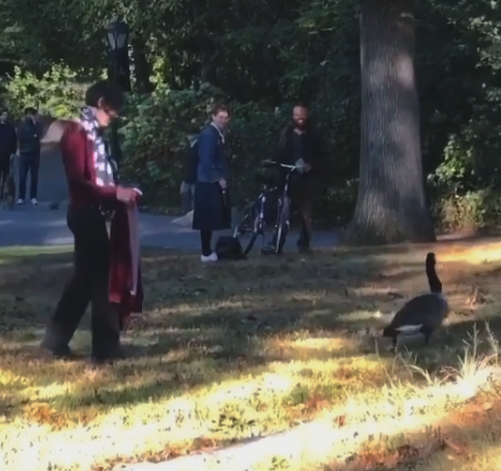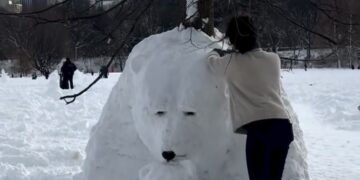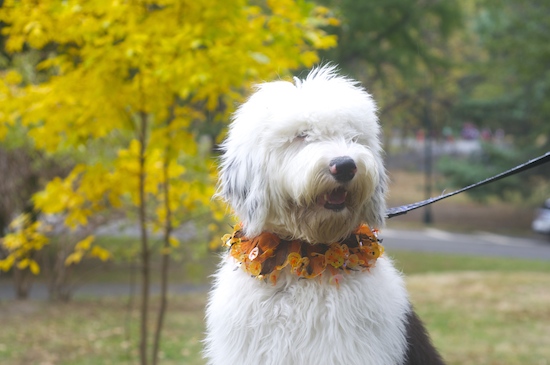It’s not so easy to catch a goose — not that anyone was suggesting it was. But Wild Bird Fund Director Rita McMahon made it look easy earlier this month when she grabbed a distressed goose in Central Park so the fund could move it to a happier place.
The people watching, who didn’t know McMahon is a wildlife expert, looked pretty surprised by the scene. Vanessa M. shot a video of it and sent it to an Instagram account called @whatisnewyork, which posted it.See the whole thing below.
The Wild Bird Fund, which rescues and rehabilitates birds and has an office at 565 Columbus Avenue, explained what was going on in its own post.
“Our executive director, Rita McMahon, skillfully re-capture a Canada goose following a failed release attempt. Calista Goose originally came to us with lead toxicity, and while in our care, became very attached to another Canada goose patient named Alyssa. Subsequently, Calista became distressed when she was released in Central Park without her friend, and she started wandering around and honking for her buddy. Rita brought Calista back to the center and both geese were relocated to a private sanctuary in upstate NY.”
https://www.instagram.com/p/B4B_2WRl8Mm/
A commenter called her the “goose whisperer.”
Vanessa M. was unfazed. She tells us “I was more fascinated than anything.”










relieved to hear the “happy ending” to this story, but why the stressful original solo release in Central Park?
Because the bird’s psychologist said it was time to be “okay being alone”.
It’s a bird, Carol!
Those big birds are simply a blight and unhygenic risk for people and pets, on the grass lawns of RPark. They molt leaving gamey tufts of feathers about and deficate prohibitively to recreation use of the grass areas, profusely basically shitting up the lawns very disgustingly. They are way out of their habitat but become annoying territorial and are particularly gross animals unlike the regular seasonal ducks creatures. Their welcome in RPark need to be seriously discouraged if not eliminated from our park frontage next season.
They are birds Michael!
They are part of the food chain. Read a little about them and you might take on a new liking for them. GL
These are migratory snow geese which are heading south with the seasonal ducks mentioned. They do no harm and actually protect the ducks they have grown up with further north in Canada over the summer. Try some kindness today.
These Canadian geese are not heading south… go online you’ll see many groups (also named) go and figure eights around the tri-state area.
As far west as Pennsylvania as far north as the Adirondack mountains and as far east around Cape Cod down to Montauk point/ Block island and south to the Jersey shore.
Canadian geese mate for life. Sounds like these two are a couple. Glad to hear they were reunited and have a safe home together!
If they live here, which they probably do, they are American geese.
But there species is called “Canada”.
So, it’s a Canada Goose.
“When birders reflexively correct common names like ‘seagull’ or ‘Canadian goose,’ they may turn newcomers off the hobby altogether. ~ Audubon Field Guide
https://www.audubon.org/news/seagull-or-gull-who-really-cares
The WIld Bird Fund is an amazing non-profit organization treating, rehabbing, caring for and releasing injured and orphaned wild birds that are brought to them from all over the 5 boroughs. They have treated close to 7000 birds this year alone…everything from Peregrine Falcons to cormorants, cardinals, bluejays, warblers, sparrows, Redtailed Hawks, and yes, those Canada Geese and the New York Pigeon. If you find an injured or orphaned bird, bring it to them at Columbus Avenue between 87th and 88th Street. And please consider donating to their cause.
I am waiting for a good recipe. Even Tiny Tim appreciated a roast goose. By the way, there is a whole tribe of Canada geese that no longer migrate south in winter. Pickings are apparently better here.
What most people don’t know about Canada geese would fill volumes. First, despite the name, they are native to ALL of North America. Many migrate, but many were also left in parks to re-populate severely decimated hunting stock back in the 1960’s-70’s, and just forgotten about for decades. In the interim, communities built up around them and all of a sudden, these geese who were ignored are now a “problem.”
Migration is LEARNED behavior – geese are not born knowing this, they are taught by parents/older, experienced geese. Some resident geese do take off with migratory, but most stay because climate/food is favorable.
If communities would implement humane, intelligent goose control, numbers would be lowered and stabilized and it would not be necessary to cruelly kill them. The USDA and their Wildlife services kill division makes literally BILLIONS (your tax dollars)from the killing of geese all over the country when they know full well that about a month after killing them, new geese come in to take their place. It does nothing to stop the goose population but it is great job security for an extremely corrupt government agency.
The truth is, it’s not the geese that are the problem – it is people. No knowledge of the natural world, intolerance of wildlife, our own overpopulation into wild habitat. This is a solvable situation and they are actually beautiful and interesting birds – lifetime mates, devoted parents, friendly, loyal to each other. Nicer than most people, in particular a few commenting here.
Geese are VERY family-oriented birds and will become severely distressed if they can’t find their family. It’s also why they’re so… grumpy. You’re seen as a threat to their families, and while you mean them no harm their reaction to any perceived threat to their loved ones is along the lines of “YOU WILL NOT HURT MY FAMILY YOU *****!!!!!” And… calm down, goose, no one is trying to hurt your family. But, you have to respect the devotion.
You rock, Rita!
Rita rocks!
Ditto! Great organization. Stop in sometime and see examples of their work. Humble people doing a good job.
Thank you so very much for the heart warming story. Special thanks to Rita McMahon and to The Wild Bird Fund for their excellent and much appreciated work.